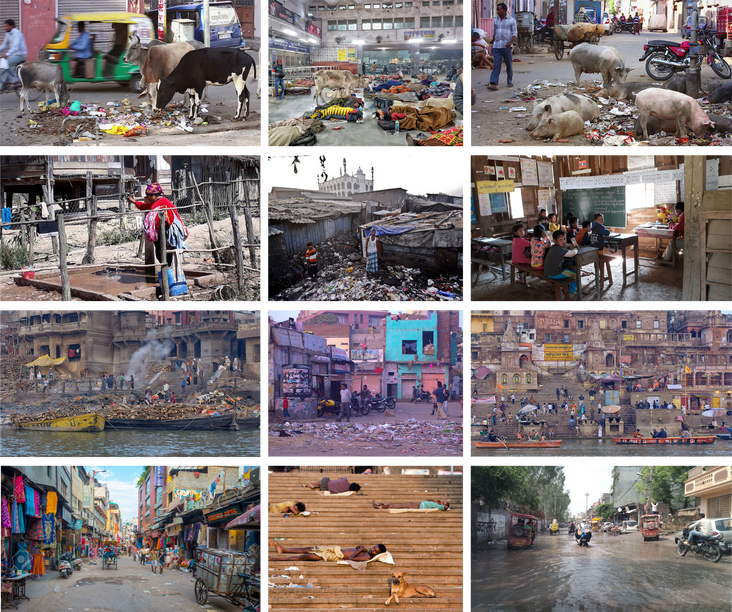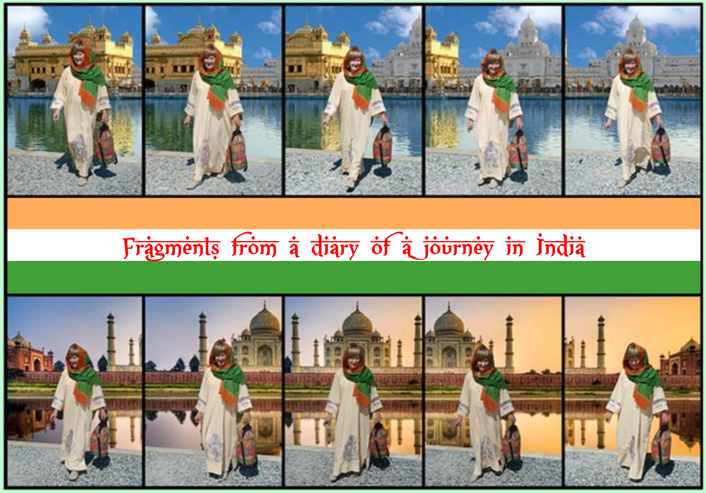
June 28th 2001:
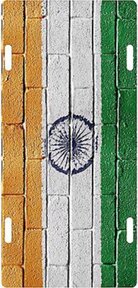
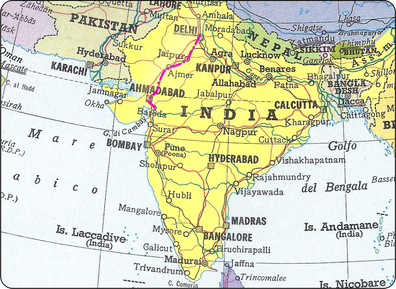
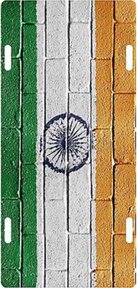
The plane lands at Delhi airport at 3 a.m. I am travelling light with hand luggage only, but since my fruit knife was confiscated at Frankfurt airport I now have to go with everyone else to the luggage carousel to reclaim it. Predictably the knife does not arrive; so after filling out the appropriate form, I leave.
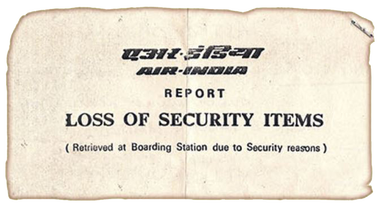 Despite the extremely early hour, as I emerge from the building I am assailed by dozens of drivers with offers of transport to 'good hotels' in town.
Despite the extremely early hour, as I emerge from the building I am assailed by dozens of drivers with offers of transport to 'good hotels' in town.Ignoring these dubious offers, I decide to investigate alternative possibilities. As I walk around I come across a small ticket office selling some kind of pre-paid tickets. I purchase one for 230 rupees and get into the shabbiest, seediest wreck of a taxi I have ever ridden in. A man seated next to the driver starts bombarding me with the questions I am to hear repeatedly throughout my stay in India: “Where do you come from?”, “Why are you travelling alone?”, “Are you married?”, “Any children?”.
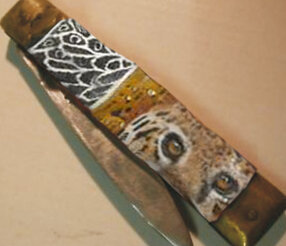 I am very upset by the loss of my knife. It has accompanied me on all my trips around the world for the last fifteen years. What's more I can't help thinking that such a safety measure is a bit futile. Do they really believe that by confiscating – and losing! - fruit knives, useful only to peel fruit and some sorts of vegetables, they are combatting air terrorism? Later, on discovering that passengers of other European nationalities were allowed to keep their fruit knives with them, my anger is twofold. Is it because I am Italian and Italians have the reputation for being hot-blooded and not stopping at the use of knives to settle accounts that I was made to hand it over?
I am very upset by the loss of my knife. It has accompanied me on all my trips around the world for the last fifteen years. What's more I can't help thinking that such a safety measure is a bit futile. Do they really believe that by confiscating – and losing! - fruit knives, useful only to peel fruit and some sorts of vegetables, they are combatting air terrorism? Later, on discovering that passengers of other European nationalities were allowed to keep their fruit knives with them, my anger is twofold. Is it because I am Italian and Italians have the reputation for being hot-blooded and not stopping at the use of knives to settle accounts that I was made to hand it over?The loss of my knife will also be the cause of my first misunderstanding with my Indian host. When, on Tuesday, I decide to return to the airport (again by taxi, after waiting for a bus for over an hour in the heat of the day and in dense fumes), my host is intrigued to know why I am going to so much trouble for just a knife. Impossible to put into words how I feel, that it is not for the knife in itself but it is for all the memories it holds for me . . . . . . .
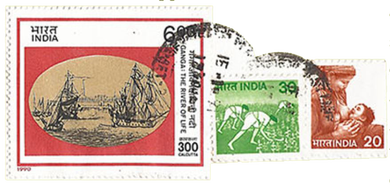 But now my host, Balraj Taneja, whose name has since been deleted from the list because of misconduct with female guests, is waiting for me along the road to his house. I am uneasy about staying with him, but the fact of the matter is that I received the letter from Harivallab Parikh just two days before I was due to leave (having written to him at the beginning of April!) and it was too late to make changes since everything had been arranged with him. I show my host the letter in which the Servas President Harivallab Parikh tells me to avoid any further contact with him. He looks appalled and hastens to give me his version of events. This discussion takes place in the only air-conditioned room in the house, his bedroom! – not very cool because of a power cut. As soon as I can I beat a hasty retreat to my room, perspiring profusely and unable to sleep because of the heat.
But now my host, Balraj Taneja, whose name has since been deleted from the list because of misconduct with female guests, is waiting for me along the road to his house. I am uneasy about staying with him, but the fact of the matter is that I received the letter from Harivallab Parikh just two days before I was due to leave (having written to him at the beginning of April!) and it was too late to make changes since everything had been arranged with him. I show my host the letter in which the Servas President Harivallab Parikh tells me to avoid any further contact with him. He looks appalled and hastens to give me his version of events. This discussion takes place in the only air-conditioned room in the house, his bedroom! – not very cool because of a power cut. As soon as I can I beat a hasty retreat to my room, perspiring profusely and unable to sleep because of the heat.Next morning – Sunday – I call the ex-coordinator, Babulal Sharma. 'Ex' in that he resigned a few months ago on the grounds that Indian Servas members are so whimsical . . . I can't comment on that, but I do know that if it hadn't been for him I wouldn't have had any help in Delhi since the only assistance the new coordinator offered was that of giving me a telephone number I already had . . . .
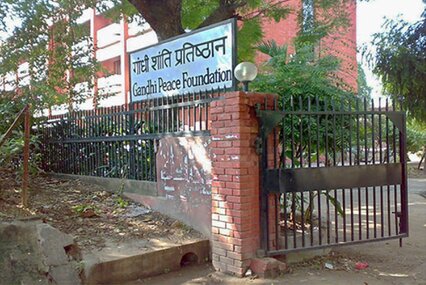 Babulal suggests I move to his house, a suggestion I act upon at once. Babulal's house is next to the Gandhi Peace Foundation's headquarters and offices are. Babulal's children are away on holiday in the mountains but might be back tonight. Oh dear, I hope not as I have visions of a fifth sleepless night. Just as I have gone off to sleep, around one o'clock, the doorbell rings – 'rings' is not the most appropriate word for the sound of something more like a bird call! I hear noisy greetings followed by tales of the holiday. I lie there desperately trying to regain my previous state of oblivion despite the noise, but to no avail. After an hour or so they turn out the light and go to bed. By this time I am wide awake. I continue to lie there in bed for some time, but eventually I get up and go outside to join Babulal's wife on the verandah to see if I can sleep better there. Mosquitoes!! How silly of me not to have remembered them! Dawn is a liberation.
Babulal suggests I move to his house, a suggestion I act upon at once. Babulal's house is next to the Gandhi Peace Foundation's headquarters and offices are. Babulal's children are away on holiday in the mountains but might be back tonight. Oh dear, I hope not as I have visions of a fifth sleepless night. Just as I have gone off to sleep, around one o'clock, the doorbell rings – 'rings' is not the most appropriate word for the sound of something more like a bird call! I hear noisy greetings followed by tales of the holiday. I lie there desperately trying to regain my previous state of oblivion despite the noise, but to no avail. After an hour or so they turn out the light and go to bed. By this time I am wide awake. I continue to lie there in bed for some time, but eventually I get up and go outside to join Babulal's wife on the verandah to see if I can sleep better there. Mosquitoes!! How silly of me not to have remembered them! Dawn is a liberation.As at this point my need to sleep undisturbed has become urgent, I decide the only course of action is to move lodgings yet again. This time I move to a nearby Guest House where I stay for two nights. My other decision is to leave Delhi the day after tomorrow. 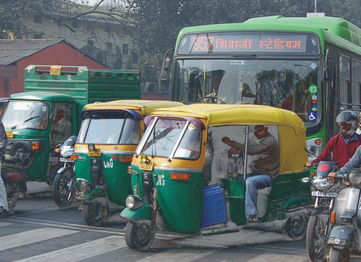 My days here have been a kind of nightmare: the unbearable heat, the crazy traffic and consequently the dreadful pollution, shoe-shiners who keep dirtying my gym shoes on purpose and then offering to clean them, the never-ending battle with the scooter drivers over unreasonable fares, the beggars. This morning a very young girl came up to me asking for money holding in her arms the tiniest newborn baby I've ever seen, no longer than 30 centimetres! At first I couldn't believe the baby was real, it seemed so impossible that, like St. Thomas, I had to touch the baby to believe my eyes. When I told Balraj how upset I was by what I had seen along the streets, he simply replied that it was the same in Rome so why the surprise.
My days here have been a kind of nightmare: the unbearable heat, the crazy traffic and consequently the dreadful pollution, shoe-shiners who keep dirtying my gym shoes on purpose and then offering to clean them, the never-ending battle with the scooter drivers over unreasonable fares, the beggars. This morning a very young girl came up to me asking for money holding in her arms the tiniest newborn baby I've ever seen, no longer than 30 centimetres! At first I couldn't believe the baby was real, it seemed so impossible that, like St. Thomas, I had to touch the baby to believe my eyes. When I told Balraj how upset I was by what I had seen along the streets, he simply replied that it was the same in Rome so why the surprise.
 My days here have been a kind of nightmare: the unbearable heat, the crazy traffic and consequently the dreadful pollution, shoe-shiners who keep dirtying my gym shoes on purpose and then offering to clean them, the never-ending battle with the scooter drivers over unreasonable fares, the beggars. This morning a very young girl came up to me asking for money holding in her arms the tiniest newborn baby I've ever seen, no longer than 30 centimetres! At first I couldn't believe the baby was real, it seemed so impossible that, like St. Thomas, I had to touch the baby to believe my eyes. When I told Balraj how upset I was by what I had seen along the streets, he simply replied that it was the same in Rome so why the surprise.
My days here have been a kind of nightmare: the unbearable heat, the crazy traffic and consequently the dreadful pollution, shoe-shiners who keep dirtying my gym shoes on purpose and then offering to clean them, the never-ending battle with the scooter drivers over unreasonable fares, the beggars. This morning a very young girl came up to me asking for money holding in her arms the tiniest newborn baby I've ever seen, no longer than 30 centimetres! At first I couldn't believe the baby was real, it seemed so impossible that, like St. Thomas, I had to touch the baby to believe my eyes. When I told Balraj how upset I was by what I had seen along the streets, he simply replied that it was the same in Rome so why the surprise.July 4th Take the morning coach to Jaipur.
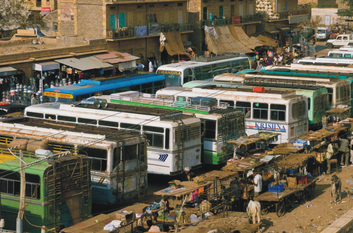 After an hour's wait at the bus station, I hear that because of the heavy rain the bus is bound to be late and might not even arrive at all. I wait some more and then decide to call Babulal to tell him what's happening. I find a telephone in the backyard of a restaurant opposite the bus station. It takes me several attempts to get a line. Close by a cook is preparing chapatis and coughing full time!! Off to my right I can see a woman washing dishes in a latrine with the dishes laid out all around the hole!! I leave a message for Babulal with the Hindi-speaking receptionist who answers my call and then make my way back to the bus station.
After an hour's wait at the bus station, I hear that because of the heavy rain the bus is bound to be late and might not even arrive at all. I wait some more and then decide to call Babulal to tell him what's happening. I find a telephone in the backyard of a restaurant opposite the bus station. It takes me several attempts to get a line. Close by a cook is preparing chapatis and coughing full time!! Off to my right I can see a woman washing dishes in a latrine with the dishes laid out all around the hole!! I leave a message for Babulal with the Hindi-speaking receptionist who answers my call and then make my way back to the bus station.  Back at the bus station there's a large group of French people who are also heading for Jaipur and are getting quite agitated because they have heard rumours that no buses are arriving and the only way to travel today is to rent a private bus. They approach me to ask whether I would care to share the bus and expenses. I hesitate and ask them who the man offering to rent them the bus is; I prefer to speak to him myself. My suspicions are aroused when they say that he will be back with the bus in a minute and that they have already left a deposit with him. What makes me even more suspicious is that none of the Indians who are also waiting for the bus to Jaipur appear to be at all interested in this affair. I can smell a trick to get money out of naïve tourists.
Back at the bus station there's a large group of French people who are also heading for Jaipur and are getting quite agitated because they have heard rumours that no buses are arriving and the only way to travel today is to rent a private bus. They approach me to ask whether I would care to share the bus and expenses. I hesitate and ask them who the man offering to rent them the bus is; I prefer to speak to him myself. My suspicions are aroused when they say that he will be back with the bus in a minute and that they have already left a deposit with him. What makes me even more suspicious is that none of the Indians who are also waiting for the bus to Jaipur appear to be at all interested in this affair. I can smell a trick to get money out of naïve tourists.The row of seats for those waiting at the bus station is conveniently located just outside the public toilets where the stench is at its most pungent and not a single molecule of the breathtaking stink coming from within is lost. It seems to me that the chief concern is to lose no opportunity to try our patience so that in this way we might earn our place in heaven in the after life. . . . . . Sitting next to me is a woman who is busy picking fleas from the head of one of her daughters while the other daughters await their turn. To my left I see a crow with a huge dead rat in its beak which it then proceeds to deposit at my feet and begins ravenously pecking and tearing at its testicles.
Around one o'clock the bus finally arrives. What luck that I didn't accept the offer of the French tourists, who are, by the way, still here waiting for the Indian they gave their deposit to! Since they have handed in their bus ticket in order to get a refund, they can't leave on the bus with me now and have no alternative but to wait and hope.
It's a good job Babulal came in answer to my phone call because otherwise I don't know how I would have coped with this pushing and shoving, yelling crowd of people all trying to board the bus at the same time. Everyone is trying to bag a seat and Babulal's help is precious. There's usually a bus every hour and this five hour delay has meant that there's an accumulation of passengers all scrambling to get on the same bus. There was a sort of roll-call, but the way my name was pronounced made it unrecognisable.
The two things that strike me most during this first trip of mine by coach are the abject poverty of the villages we go through and the number of road accidents. Here I am in Rajastan and in all the books I have read Rajastan has been described as one of the wealthiest states in India, but you would hardly say so judging from what I am seeing. As a result of the torrential rain in recent days, everyone – people and animals alike – is sunk up to the knees in mud. Mountains of stinking rubbish everywhere attract millions of flies and the children look under-nourished and are suffering from all manner of diseases. My thoughts turn to my own pupils who just now are enjoying their holidays at the seaside or in the mountains, often their every whim met no matter what the cost. . . . .

Going through one of these poor villages, against a background of miserable shacks I glimpse a sign saying “Buy M.V.A. books for compatitive (sic) exams”!
The journey takes six hours in all and I see the most appalling lorry accidents, six in all – which now I consider a lot. I don't know yet that later, on my way to Surat, I'll see an accident every five minutes, and I'll become so accustomed to these road accidents that I'll scarcely notice them any more. Now, along the road to Jaipur, I am upset by all the accidents we pass, wrecked lorries whose driver's cabins just don't exist any longer. At a certain point I see a man lying on the ground no more than a couple of metres from one of these overturned lorries. At first I think the man must be dead, perhaps he was one of the drivers involved in the crash, but then I realise that he is simply sleeping and not even the noise of the lorry accident so nearby had woken him!
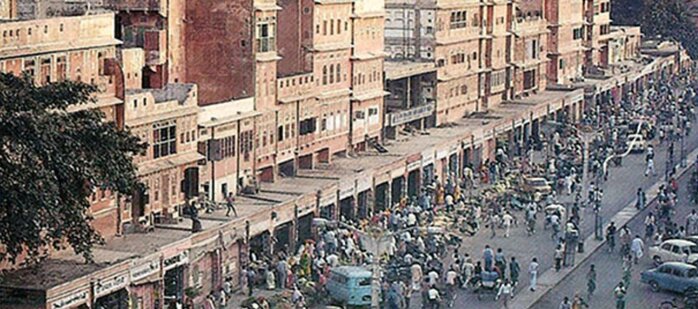
On arriving in Jaipur bus station we are attacked on all sides by taxi, rickshaw and scooter drivers all touting for business. I go with a certain Mr Sudhir, a fellow passenger here on business, to the Mangal Hotel. Mr Sudhir, such a kind person, is a sales representative for a firm that does works in marble and he has already been to Italy, to Carrara. He is evidently at home in the Mangal Hotel and he even gets me a discount! This is an acquaintance who will turn out to be very precious to me. To start with he has saved me from being assailed by rickshaw drivers at the bus station, and then this Mangal Hotel is just the kind of hotel I usually choose to stay at: basic without being squalid or too dirty. There are rooms of varying categories and prices and I am given a single room, not nearly as nice as Mr Sudhir's in which there's even a colour television, and I can't help wondering what the small crowd of idle boys on each floor are there to do. 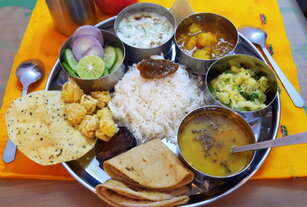 In the evening Mr Sudhir takes me out to eat at Niro's, the best restaurant in the city, where I enjoy a truly delicious vegetarian meal.
In the evening Mr Sudhir takes me out to eat at Niro's, the best restaurant in the city, where I enjoy a truly delicious vegetarian meal.
 In the evening Mr Sudhir takes me out to eat at Niro's, the best restaurant in the city, where I enjoy a truly delicious vegetarian meal.
In the evening Mr Sudhir takes me out to eat at Niro's, the best restaurant in the city, where I enjoy a truly delicious vegetarian meal.I had written to my hosts in Jaipur but had not received a reply, so now I call them to find out whether they can in fact put me up. The first person I call is Agrawal who tells me that he is really busy right now due to a meeting of all the Kadi members. However, he says he will come to the hotel at eight o'clock tomorrow morning.
One of the things I have gleaned from my readings about India is that the concept of 'privacy' is unknown here. Well, this is borne out by the fact that there is a window in the toilet of my hotel room which gives on to the toilet of the next door guest room!! And this morning I was rudely awoken at 5.30 by all the dreadful noises my Indian neighbours were making in the toilet. Hinduism dictates that one should free the body from all impurities, so among other noises, plenty of spitting! It would seem that if I intend to stay on in this hotel there is only one way to beat all this and that is to set my alarm for 4.30 a.m. and use the toilet first.
When Agrawal arrives it is pouring with rain and so when I say that I had planned to go to the Jantar Mantar today he offers to take me there by Jeep. He gets out en route and the driver takes me on to the City Palace, near the Observatory. Agrawal invites me to lunch at his house.
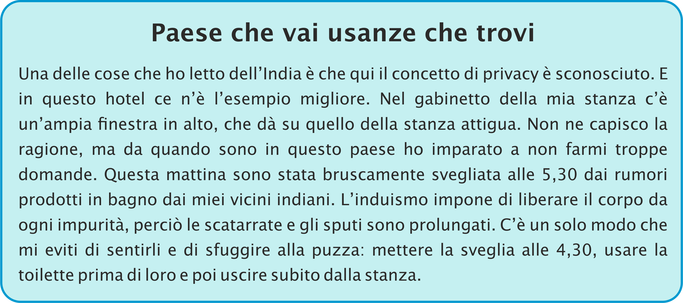
July 5th Jaipur
Monsoon in full spate; mud everywhere. Seeing that getting around is well nigh impossible, make my way towards the public library which I have been given directions for. The building is magnificent but in bad condition. A group of about ten youngsters standing around the entrance show me the door to a room that I believe to be the newspaper reading room. However, from here I am then sent up to the next floor where I enter a very dusty room in which an old man is reading a newspaper. There is another man at a desk who is sleeping. The old man and I manage to wake him, but not without some difficulty! Having allowed him the time to overcome the shock of being woken and seeing us there, I explain what I am looking for.
 He points to the files. I consult a board hanging on the wall to find the number for literature, the section I am interested in. However, I then find that the drawers containing the file-cards are not numbered. I decide to open them at random: in the second drawer I recognise some of the writers' names on the cards, but they are arranged in no apparent order, either alphabetical or any other. Nevertheless, I do find cards for three books that interest me: A History of Indian Literature; A Literary History of India; Sanskrit Poetesses. Meanwhile the librarian brings me books by Kalidasa (3 copies of the same book!), books I had requested previously, all dusty and dirty. I give him the reference numbers of four books that I have copied on scraps of paper from torn receipts that he had retrieved from the waste-paper basket. He goes off in search of the books.
He points to the files. I consult a board hanging on the wall to find the number for literature, the section I am interested in. However, I then find that the drawers containing the file-cards are not numbered. I decide to open them at random: in the second drawer I recognise some of the writers' names on the cards, but they are arranged in no apparent order, either alphabetical or any other. Nevertheless, I do find cards for three books that interest me: A History of Indian Literature; A Literary History of India; Sanskrit Poetesses. Meanwhile the librarian brings me books by Kalidasa (3 copies of the same book!), books I had requested previously, all dusty and dirty. I give him the reference numbers of four books that I have copied on scraps of paper from torn receipts that he had retrieved from the waste-paper basket. He goes off in search of the books.  A quarter of an hour later he reappears: one of the books is the wrong one as he has not taken into account the zero in the number. The other book he hands me is tied up with string since it is falling apart and this is the only way to keep it intact. As I carefully untie it – the librarian chooses that very moment to switch on the fan – clouds of dust fly out from the pages. The two books that interested me most have not been found.
A quarter of an hour later he reappears: one of the books is the wrong one as he has not taken into account the zero in the number. The other book he hands me is tied up with string since it is falling apart and this is the only way to keep it intact. As I carefully untie it – the librarian chooses that very moment to switch on the fan – clouds of dust fly out from the pages. The two books that interested me most have not been found.By now the librarian has gone back to his friends – there are now four of them – to chat and sip tea. I begin to feel like an intruder who has come and broken into the daily routine of these people, a routine of naps, pleasant chats, newspaper readings, tea drinking and so forth . . . by rushing in at ten o'clock in the morning.
It is now 10.45 and the men are enjoying a lively discussion. This library seems to be a meeting point for friends who come here especially on rainy days.
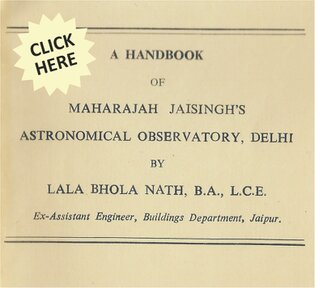 The first Servas member I meet in Jaipur is Agraval. He arrives at the hotel at 8 o'clock in a chauffeur driven Jeep and, seeing that it is pouring, has me driven in the Jeep to the observatory of Jai Singh where I mean to spend the morning studying the astronomical instruments. Agraval invites me to lunch in the 'ashram' where he lives, 12 kilometres out of Jaipur. I have the unfortunate idea of going there by trishaw (cycle rickshaw). As we set off the cyclist pedals through the puddles, then when I find myself almost completely splattered in mud and after my inappropriate protest, he cycles along in the middle of the road where there are no puddles but instead there are cars and lorries which overtake us right and left. At lunch I find myself to be the only woman among the heads of the various Khadi centres. We eat seated on the floor, from plates made out of leaves, a delicious vegetarian meal. Unfortunately there is no-one who can speak English, making communication extremely difficult.
The first Servas member I meet in Jaipur is Agraval. He arrives at the hotel at 8 o'clock in a chauffeur driven Jeep and, seeing that it is pouring, has me driven in the Jeep to the observatory of Jai Singh where I mean to spend the morning studying the astronomical instruments. Agraval invites me to lunch in the 'ashram' where he lives, 12 kilometres out of Jaipur. I have the unfortunate idea of going there by trishaw (cycle rickshaw). As we set off the cyclist pedals through the puddles, then when I find myself almost completely splattered in mud and after my inappropriate protest, he cycles along in the middle of the road where there are no puddles but instead there are cars and lorries which overtake us right and left. At lunch I find myself to be the only woman among the heads of the various Khadi centres. We eat seated on the floor, from plates made out of leaves, a delicious vegetarian meal. Unfortunately there is no-one who can speak English, making communication extremely difficult. July 6th
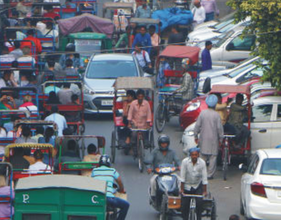 Take a three wheeler to the tourist office. The driver turns off Nehru Avenue into a side street. We are now a long way from the town centre and it seems odd to me that the tourist office should be in such a secluded place.
Take a three wheeler to the tourist office. The driver turns off Nehru Avenue into a side street. We are now a long way from the town centre and it seems odd to me that the tourist office should be in such a secluded place. 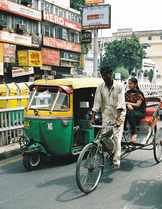 As if this isn't enough, the driver turns off yet again into a narrow muddy lane where the houses are rather poor-looking. I begin to fear the worst and to doubt that the driver is in fact taking me to the tourist office. Getting ready to leap out of the rickshaw and make my getaway when, at the end of the lane on the left, I see a much larger house, without any sign, but under the porch of which I glimpse posters of various places in India.
As if this isn't enough, the driver turns off yet again into a narrow muddy lane where the houses are rather poor-looking. I begin to fear the worst and to doubt that the driver is in fact taking me to the tourist office. Getting ready to leap out of the rickshaw and make my getaway when, at the end of the lane on the left, I see a much larger house, without any sign, but under the porch of which I glimpse posters of various places in India.July 7th
Meet Trilockhchand Jain. After many enquiries (can't find the house, nobody seems to know him; and to think that he was the Health Minister for Rajastan). This is an intriguing house, quite different from any I have seen so far. We agree to meet again in August when I return here.
The driver takes me to some relatives of his (so he says), who are today opening a shop selling jewellery and precious stones. We go down a series of side streets which become narrower and narrower, going in and out of dark caves, ideal for an ambush. We climb a flight of stairs and enter. Inside all is elegance and the gems, for what little I know of such things, seem truly beautiful.
 Go to see another Servas member, Munish, owner of a language school. Am offered a job: in effect the position of Italian language teacher is vacant since the previous teacher left some time ago. Invited to lunch on Sunday.
Go to see another Servas member, Munish, owner of a language school. Am offered a job: in effect the position of Italian language teacher is vacant since the previous teacher left some time ago. Invited to lunch on Sunday.Try to make a call to Italy from the hotel and the operator, after numerous unsuccessful attempts, informs me that the dialling code 00.39.121 does not exist in India. Wonder what kind of muddle the operator has made.
Move on to Galta, a delightful place some kilometres from Jaipur.
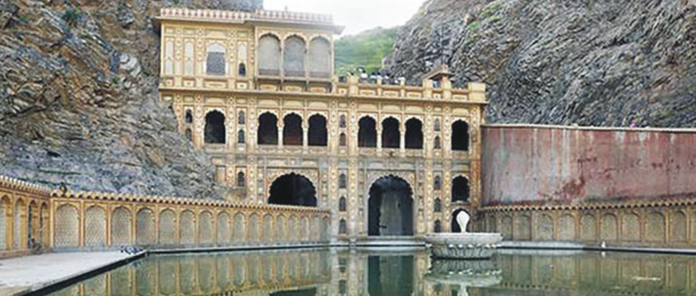
July 11th Towards Ajmer
After a kind of pilgrimage to four different ticket offices in search of a ticket, I sit and wait for the coach, which should be leaving from bay one. I even enquired whether all the coaches going to Ajmer leave from this bay. A coach arrives and the conductor approaches signalling me to load my luggage. He hands me a ticket and I pay him. But something makes me feel uneasy: how is it that the luggage is loaded and passengers board and take their seats a good half an hour before departure time?
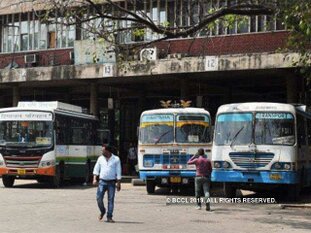 I decide to make further enquiries and my suspicions prove founded: this is the coach for Ajmer, but it is the 8 o'clock one running half an hour late while I am booked instead on the 9 o'clock coach. The conductor gives me my money back, I give him my luggage receipt and head for the toilets, leaving my bag outside unattended seeing that the barman refused to allow me to leave it inside his place for a couple of minutes. The noise in the coach station is deafening: a radio blares out music and ads. with unbearable loudness.
I decide to make further enquiries and my suspicions prove founded: this is the coach for Ajmer, but it is the 8 o'clock one running half an hour late while I am booked instead on the 9 o'clock coach. The conductor gives me my money back, I give him my luggage receipt and head for the toilets, leaving my bag outside unattended seeing that the barman refused to allow me to leave it inside his place for a couple of minutes. The noise in the coach station is deafening: a radio blares out music and ads. with unbearable loudness.Departure almost on time. I take a seat just behind the driver for the first and last time. Better to be further back and so not be able to witness the overtaking and the sudden swerves off road in order to avoid oncoming lorries.
July 12th Ajmer
Called the coordinator on arrival. Spoke to his wife who said she and her husband would call me back in the evening. He is away because he's in court where his job is counsel for the defence. They will in fact call me only three days later, on the eve of my departure from Ajmer. They say they have tried calling me on several occasions but the phone was not working. Mind you, their house is no more than 500 metres from the Tourist Bungalow where I am staying, I realized later. They invite me round at 10.30 the following morning. When I arrive, he is eating 'thali'. “Early lunch or late breakfast?” I ask. I am told that he has a first lunch at 10.30 before going to the court house, and then a second lunch at 2.30 when he returns home. I am in fact told to come back then.  I have an appointment in the afternoon I say. “Be sure to be here by 2.30!” he says. I haven't been in Servas many years, but I swear that I have never ever received an order of this kind. I am sorely tempted to refuse categorically, particularly since I dislike this fellow: hair dyed very black, smart light-blue suit, red tie, a man of few words and long silences which it is hard to know how to fill. But finally my good manners prevail over the feelings that his invitation, issued in such an unorthodox manner, have aroused in me. At 2.15, having severely burned my mouth by hurrying my consumption of a boiling hot pot of tea, I go out under the porch to await the arrival of the lawyer's son who is to collect me on his motorbike on his way home from school. It is ten past three when he finally arrives. His father, he says, has been delayed in court. I fail to make the connection between the two events.
I have an appointment in the afternoon I say. “Be sure to be here by 2.30!” he says. I haven't been in Servas many years, but I swear that I have never ever received an order of this kind. I am sorely tempted to refuse categorically, particularly since I dislike this fellow: hair dyed very black, smart light-blue suit, red tie, a man of few words and long silences which it is hard to know how to fill. But finally my good manners prevail over the feelings that his invitation, issued in such an unorthodox manner, have aroused in me. At 2.15, having severely burned my mouth by hurrying my consumption of a boiling hot pot of tea, I go out under the porch to await the arrival of the lawyer's son who is to collect me on his motorbike on his way home from school. It is ten past three when he finally arrives. His father, he says, has been delayed in court. I fail to make the connection between the two events.
 I have an appointment in the afternoon I say. “Be sure to be here by 2.30!” he says. I haven't been in Servas many years, but I swear that I have never ever received an order of this kind. I am sorely tempted to refuse categorically, particularly since I dislike this fellow: hair dyed very black, smart light-blue suit, red tie, a man of few words and long silences which it is hard to know how to fill. But finally my good manners prevail over the feelings that his invitation, issued in such an unorthodox manner, have aroused in me. At 2.15, having severely burned my mouth by hurrying my consumption of a boiling hot pot of tea, I go out under the porch to await the arrival of the lawyer's son who is to collect me on his motorbike on his way home from school. It is ten past three when he finally arrives. His father, he says, has been delayed in court. I fail to make the connection between the two events.
I have an appointment in the afternoon I say. “Be sure to be here by 2.30!” he says. I haven't been in Servas many years, but I swear that I have never ever received an order of this kind. I am sorely tempted to refuse categorically, particularly since I dislike this fellow: hair dyed very black, smart light-blue suit, red tie, a man of few words and long silences which it is hard to know how to fill. But finally my good manners prevail over the feelings that his invitation, issued in such an unorthodox manner, have aroused in me. At 2.15, having severely burned my mouth by hurrying my consumption of a boiling hot pot of tea, I go out under the porch to await the arrival of the lawyer's son who is to collect me on his motorbike on his way home from school. It is ten past three when he finally arrives. His father, he says, has been delayed in court. I fail to make the connection between the two events. I would like to add, for the benefit of anyone who means to go to Ajmer as a Servas traveller, that on the list there is an address to which I had regularly written. When I telephoned a woman answered who, in extremely irritated tones, said that she had never heard of Servas, had never received any letters from me, and that obviously she wouldn't dream of putting me up.
I would like to add, for the benefit of anyone who means to go to Ajmer as a Servas traveller, that on the list there is an address to which I had regularly written. When I telephoned a woman answered who, in extremely irritated tones, said that she had never heard of Servas, had never received any letters from me, and that obviously she wouldn't dream of putting me up.July 13th
The Indians are very faithful followers and practisers of the proverb “don't do today what can be left till tomorrow”. But here at the Tourist Bungalows in Ajmer I have found the most outstanding exception to this rule in the person of one of the receptionists, personification of efficiency and quick-mindedness to the extent that I find it hard to keep up with him, used as I am by now to the rhythm of the Indians. However, if you don't happen to coincide with his work shift it is definitely necessary to urge the others on a bit. “You can pay tomorrow morning” is the reply when I ask to settle my bill now. I point out that tomorrow morning I am leaving at 4.30 a.m. The receptionist now resigns himself to finding my name in the book where the guests are registered, only to discover that my name is not there. Fortunately it turns out that my name and what I myself had written on arrival are in the other register.
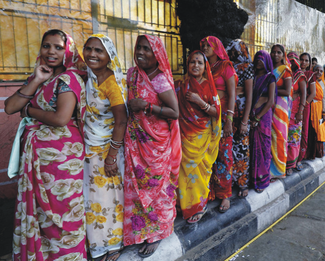 At the coach station I get into line in the section reserved for female travellers. There is no-one yet in the section reserved for the men. However, when the ticket clerk arrives a male passenger passes in front of me to buy his ticket. The English habit of queueing has decidedly not left its mark here. But does making the women form a separate queue make it easier to pass in front of them?
At the coach station I get into line in the section reserved for female travellers. There is no-one yet in the section reserved for the men. However, when the ticket clerk arrives a male passenger passes in front of me to buy his ticket. The English habit of queueing has decidedly not left its mark here. But does making the women form a separate queue make it easier to pass in front of them?I enquire where the coach for Udaipur leaves from: from bay 6 the ticket clerk informs me. At bay 6 (written in Hindi, of course), there's already a coach waiting. “Does this coach go to Udaipur?” I ask in English. There's a huge sign of denial which I interpret as “No” and accordingly get off again. However, they must have meant that they didn't understand what I was saying. Meanwhile the coach fills up and by the time I discover that not only is this the right coach but also that there is very little place left I become anxious.
General notes: all that is considered ill mannered in our country (spitting, burping noisily, blowing noses by hand, affectations of every kind, laughing at people behind their backs, breaking wind loudly, using the street for toilet needs, weeing in public, scratching one's behind, touching or holding ones genitals in front of others),is done as prominently as possible here.
July 15th Udaipur
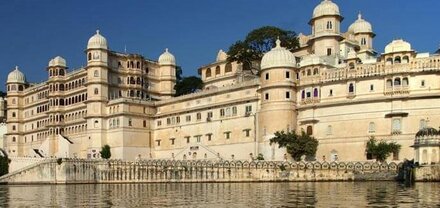 A relaxing and relaxed day. Morning at the City Palace with the group of very pleasant Spanish I met in Delhi and then met again here. In the afternoon they leave on an organised tour around Udaipur, I go off to the public gardens for a walk. Find myself continually pestered by groups of Indians. Some of these, armed with cameras, invite me to be photographed with them. When I refuse they take a photo all the same, using flash.
A relaxing and relaxed day. Morning at the City Palace with the group of very pleasant Spanish I met in Delhi and then met again here. In the afternoon they leave on an organised tour around Udaipur, I go off to the public gardens for a walk. Find myself continually pestered by groups of Indians. Some of these, armed with cameras, invite me to be photographed with them. When I refuse they take a photo all the same, using flash.July 16th At the Tourist Bungalow
They are cleaning the room next door. They've carried out all the furniture, they've rolled and carried out the carpet, now they are disinfecting, spraying tons of D.D.T. or some other disinfectant. When I enquire “Has someone died from some contagious disease?” I am told “No, this is just routine cleaning”. So I enquire “How often do you clean like this?” and receive the reply “Once a month”. The manager asks me if I am comfortable. “There's a strong smell coming up from the kitchens”, I tell him. “Just keep the window closed”, he replies. Too bad it’s not ideal with the thermometer registering 50º!
July 18th
I’m behind with events. The evening of the 16th I called Hukumraj Mehta. He came immediately, on his Vespa, in the raging monsoon. A great friend of the Manager, we go to his house. We are offered whisky, Hukumraj insists I drink some. He cites the tale of the woman who, rather than refuse an offered drink, drank poison. He is also very insistent that I should move into his house at once. Wisely I prefer to see what the accommodation is like. Next day I see it. Since his two married children live with him, only his room remains, the room where he both lives and sleeps. Should I not wish to share the bed with him, there is always the thickly carpeted floor, quite dirty . I imagine myself with my face on it. But if the alternative is to sleep with him in his bed…
Another Servas member until recently was working here in the Tourist Bungalow but has now been transferred to Ahmedabad.
Afternoon busy with meetings: 3 p.m. go to see the owner of a road transport firm. Hanging on the office wall there is a large picture of Christ, next to Brahma and Gandhi. When I ask why the picture of Christ, I'm told that even though leader of a different religion, he is equally respected. I also learn that, contrary to Catholic belief, Christ did not die on the cross, but he descended from the cross and directed his footsteps towards Kashmir where he had a meeting with some Buddhist monks.
5 p.m. Go to see Miss Ritu Dave, a doctor specialising in neurology. Am offered a drink of hot chocolate which, given the outside temperature, makes me perspire even more than before. Her mother, who I later learn is slightly strange, crosses the room, her head tipped back and neither looking at us nor saying 'hello'. Conversation comes round to a woman's situation in India and Ritu tells me about her own difficulties with her fellow university students, who are almost all male, in getting them to accept the fact that for the moment she is focussed on finishing her studies and starting out on her profession, and only then might she eventually think about marriage . . . she is 29 now, an age which here is considered old for a woman. While following Ritu into her room I see her mother lying on the bed in the kitchen, her head dangling backwards over the edge of the bed . . .
July 19th Travelling to Eklingij
Leave by bus for Eklingij and a 'non' visit to the Hindu temple of Nathdwara. Along the way see a signpost to the Perfect Public School, which, in fact, is nearby. Seen from the outside it appears far from perfect. We also have a minor collision with a tractor, but we carry on, albeit with an extra dent.
July 20th
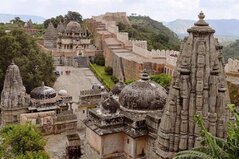 Leave at 10 a.m. for the plot of land Hukumraj has bought and where he plans to set up a sort of working community with the tribes people.
Leave at 10 a.m. for the plot of land Hukumraj has bought and where he plans to set up a sort of working community with the tribes people.July 21st
Departure for Ahmedabad. The fat man seated next to me on the coach occupies a fair part of my seat too, however, he is kind and protests on my behalf when the sharp corner of another passenger's briefcase hits my sunglasses while I am leaning forward in order to retrieve something from my handbag.
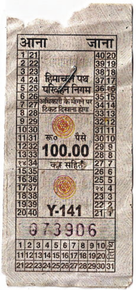 A man signals me to sit by him, where there are already four men squeezed in next to one another. Talking to this man I discover that he is a ticket inspector. In fact, a short while later he gets up and begins checking that everyone has a ticket. There are some passengers without and I think that, like it is with us, they are subject to a fine. I can see them reacting rather vigorously. When it is my turn to show my ticket, it can't be found anywhere. I go carefully through everything I have in my purse, which is where I usually keep tickets, then through my bag, but in vain. The ticket does not turn up. I search my pockets but find nothing there either. Then suddenly I remember that above my right trouser pocket there is a tiny pocket which I hardly ever use. When I boarded the coach it was with ticket in hand in order to check with the driver that this was the right bus. In my anxiety to find somewhere to sit on this packed coach, I must have distractedly pushed my ticket into this tiny pocket. And there it is, all screwed up. The fine would have been 500 rupees: what a relief not to have to pay it!
A man signals me to sit by him, where there are already four men squeezed in next to one another. Talking to this man I discover that he is a ticket inspector. In fact, a short while later he gets up and begins checking that everyone has a ticket. There are some passengers without and I think that, like it is with us, they are subject to a fine. I can see them reacting rather vigorously. When it is my turn to show my ticket, it can't be found anywhere. I go carefully through everything I have in my purse, which is where I usually keep tickets, then through my bag, but in vain. The ticket does not turn up. I search my pockets but find nothing there either. Then suddenly I remember that above my right trouser pocket there is a tiny pocket which I hardly ever use. When I boarded the coach it was with ticket in hand in order to check with the driver that this was the right bus. In my anxiety to find somewhere to sit on this packed coach, I must have distractedly pushed my ticket into this tiny pocket. And there it is, all screwed up. The fine would have been 500 rupees: what a relief not to have to pay it!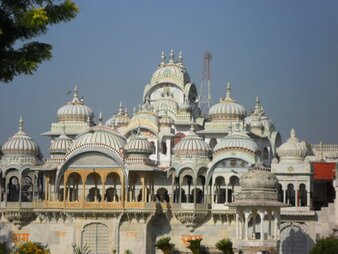 The landscape is interesting: small villages, countryside very green, succulent plants . . . The driver is unusually prudent: 3 hours into our journey we stop in order to drink at Bilwhwara where there's a man who has been standing on one leg only for years . . . . . .
The landscape is interesting: small villages, countryside very green, succulent plants . . . The driver is unusually prudent: 3 hours into our journey we stop in order to drink at Bilwhwara where there's a man who has been standing on one leg only for years . . . . . . Go into the small bar of the bus station: as soon as I pass the threshold I am greeted by an uproar. The bar is full of men who immediately surround me laughing scornfully and making loud comments. It scares me dreadfully: if it weren't for the fact that I desperately need to purchase some water, I would dash back to the coach at once. All these men press in on me so that I can scarcely move, not to mention getting out. When finally I manage to return to the coach, I notice that there's been an almost total change of passengers: there are now a lot of 'tribes people' dressed in colourful costumes in a distinctive style. Some of these people remind me of our gypsies in physically and they are very different from most other Indians.
So far I have counted six lorries smashed in road accidents.
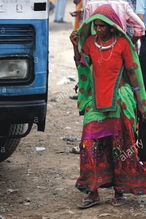 In Ahmedabad I ask the scooter driver to take me to the Ritz Hotel. He takes me instead to the Rivera where I'm told that the Ritz has been closed for over a year now. After asking the price, I decide to stay. The room is very comfortable, the shower splendid. Call Suoryakhant Parikh, who comes to fetch me at 3.30 p.m. and takes me, in a tiny and incredibly low sidecar (I find myself practically sitting on the ground), to meet the Tourist Officer of Udaipur who has been transferred here. This kind Servas member inundates me with leaflets of Rajastan and gives me lovely postcards which it has been impossible to find on sale anywhere.
In Ahmedabad I ask the scooter driver to take me to the Ritz Hotel. He takes me instead to the Rivera where I'm told that the Ritz has been closed for over a year now. After asking the price, I decide to stay. The room is very comfortable, the shower splendid. Call Suoryakhant Parikh, who comes to fetch me at 3.30 p.m. and takes me, in a tiny and incredibly low sidecar (I find myself practically sitting on the ground), to meet the Tourist Officer of Udaipur who has been transferred here. This kind Servas member inundates me with leaflets of Rajastan and gives me lovely postcards which it has been impossible to find on sale anywhere.22d July Ahmedabad
My first visit in Ahmedabad was to the Sabarmati Ashram and Museum, founded in 1963, in order to keep alive the message of Gandhi’s life and work.
The Mahatma spent 15 years in Ahmedabad and he left on the 12th March 1930 on the famous Salt March.
There is a collection of Gandhi’s writing and letters. The gallery consists of photographs and important documents. In the library I saw a group of studentsinterested in studying Gandhian thoughts.
When I finished the visit, I sat under a tree and reflected on this man,whose life has changed the history of his country and the world for the better. The non violent activism of the “father” of the Indian indipendence reached far beyond his homeland, becoming a global call for the oppressed all over the world to stand up for freedom and justice through peaceful protest.
One of Gandhi’s lines that I like is: “Earth provides enough to satisfy every man’s needs, but not every man’s greed.”
Gandhi Ashram

FRA TRADIZIONI, POVERTA' E DISEGUAGLIANZE
